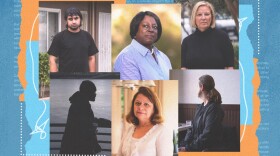
New numbers out on Thursday show the death toll in Iraq fell dramatically in October — for Iraqi civilians, security forces and U.S. troops.
The Iraqi interior ministry says violence across the country is down nearly 70 percent since June, when the U.S. completed its "surge" of additional combat forces into the country.
While security has improved, many Iraqis are skeptical it will last unless the Iraqi government does much more to take advantage of the progress.
Signs of Improvement
On Wednesday, Iraqi security forces removed massive concrete blast walls that had been up since the summer of 2003 — blocking car traffic and access to Palestine Street, in the Zayuna neighborhood of eastern Baghdad.
The re-opening of the area means Abeer Abdullah can now safely take her two children to a nearby park and garden to play. It's an outing the family wouldn't have dared to make even a few short weeks ago.
"Before we couldn't even open our front doors or visit our relatives and neighbors," Abdullah says. "Now it's much better. God willing, it will stay this way."
The 24-year-old housewife nibbles on sunflower seeds and pushes her son on a park swing. She offers thanks to Allah — not the Iraqi government — for the improved security.
"The people, I tell you, the people did this. They got tired and challenged all the problems [with] the insurgents," Abdullah says. "Not the government. The government did nothing. Our neighborhoods are still very bad, but here we can stay out now, until nine or nine thirty at night."
A Fragile Security
Iraqi interior ministry figures — considered an imperfect, yet instructive tally — show that 317 Iraqi civilians were killed in October in greater Baghdad.
Last January, when sectarian violence still raged, the monthly death toll nearly hit 2,000. Also, the U.S. military reports that 38 American servicemen lost their lives in Iraq in October, the lowest monthly death toll since March 2006 — and well below the 65 killed in September.
But security progress remains incredibly fragile.
The U.S. military says Sunni extremists continue to control key parts of the Baghdad districts of Adhamiyah, Mansour and West Rashid. In Hurriya in northwest Baghdad, rival Shiite factions are killing each other for control of Sunni-owned homes, whose residents were forced to flee the area.
North of Baghdad, bombings and sectarian killings continue to plague the cities of Baqouba and Kirkuk. Clashes between rival Shiite groups continue in the south.
Nonetheless, says Philip Reeker, the spokesman for the U.S. ambassador to Iraq, security has improved enough to open a window of opportunity.
"People are saying, 'We've had enough of this. We want to move forward with our lives,'" Reeker says. "And that means jobs. That means economic development."
Where's the Government Action?
But it appears that the Iraqi government is doing little to foster development.
A new report by the U.S. Government Accountability Office shows that the $103 billion Iraqi reconstruction effort remains uneven, at best.
Even many Iraqi lawmakers concede that sectarianism and political paralysis continue to impede Iraq's rebuilding, further undermining public trust in the government.
Dr. Mahmoud Othman, a Kurdish member of the Iraqi parliament, says the public sees some improvement. But, he adds, "They want to see improvement in the services, improvement politically, improvement in corruption."
Several key Iraqi ministries, he says, remain bogged down by corruption, security fears, sectarianism and incompetence.
"If the political forces ... don't get together, away from sectarian differences and problems and so on — if that doesn't happen — I'm afraid security couldn't last," Othman says.
'Concerned Citizens' Aid Security
The U.S. military credits security progress, in part, to new alliances with Sunni tribes and former insurgents who are now helping in the fight against al-Qaida in Iraq.
These American-funded "concerned citizens" groups, as the U.S. military calls them, have bolstered security while providing jobs to Sunnis.
But it's a temporary fix. Andrew Passen leads the State Department's Reconstruction Team for Baghdad. He says now is a critical moment for the Iraqi government "to step up" and play a much bigger role in creating jobs and improving services.
The surge has created a much more permissive security environment," Passen says. "We need to exploit the surge and exploit the chance to go out and engage where Iraqi institutions can work more safely throughout the city."
But few Iraqis have faith that the American-backed government will move swiftly to make the political and economic compromises necessary to capitalize on the hard-won and still delicate security gains.
Copyright 2022 NPR. To see more, visit https://www.npr.org. 9(MDAzMjM2NDYzMDEyMzc1Njk5NjAxNzY3OQ001))







